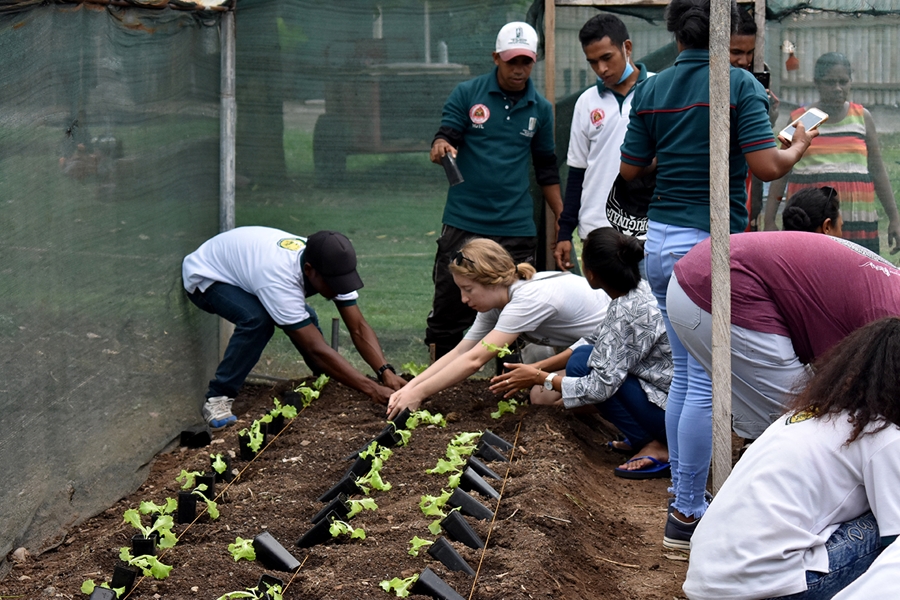
FAYETTEVILLE, Ark. – Three students in the Dale Bumpers College of Agricultural, Food and Life Sciences recently participated in a study abroad trip to Timor-Leste as part of an online consortium between the University of Arkansas, Texas A&M University and Texas Tech University.
Timor-Leste is mostly mountainous also known as East Timor. A relatively new country in Southeast Asia, it formed its independence from Portugal in 1975 and Indonesia in 2002, and covers half the island of Timor.
The interdisciplinary course focused on horticulture, nutrition, community development and crop marketing.
U of A students participating were Olivia Caillouet, a horticulture, landscape and turf sciences graduate and a master's degree student in agricultural and extension education; Katie Dobbins, also a master's degree student in agricultural and extension education; and Karlee Pruitt, an agricultural education, communications and technology graduate and a master's degree student in horticulture.
The eight-person group, which also included students from Texas A&M, received classroom instruction from HIAM Health, a local non-governmental organization created to educate and lead the Timorese to eat healthy and live well. The group then applied those concepts in the field.
Their two-week stay included work at a youth vocational school, visits to farms on the west side of the country, educational outreach on various topics and collaboration with National Timor University.
For the horticulture component, they worked at HIAM Health in the horticulture gardens before going into the communities.
"This was a great way to practice our skills before sharing them with community members," said Caillouet. "In the horticulture garden, we created a raised garden bed and a lasagna-style garden that used various organic materials as ingredients to increase soil health. We also worked with a Timorese community to remove weeds, recreate garden beds and harvest a high-value crop, moringa. This allowed us to learn techniques such as efficient weed removal methods, importance of soil health and proper harvesting procedures."
The nutrition component included a cooking class on the historical importance of Timorese food and the nutritional value of the recipes. Students also participated in nutritional outreach focused on the major food groups (protein, nutrients and carbohydrates).
For community development, they participated in a community needs assessment to learn how HIAM Health can support the community.
"The needs assessment taught us that the community desperately needed several water tanks for irrigating crops in more remote locations away from the main water source," said Caillouet. "HIAM Health was able to promise the community water tanks and piping to get water to the tanks based on the assessment."
The crop marketing portion detailed challenges for developing nations in marketing crops.
"One of the greatest challenges facing crop marketing and distribution is the ability to get crops from farms to markets," said Caillouet. "Road conditions are poor and vehicles for transportation can be difficult to obtain. At the USAID office, we saw different examples of 'value-added' techniques that increased the shelf-life of the products, such as dehydrated banana chips, dehydrated fruit and fruit jams."
The trio participated after enrolling in a research experience opportunity through the Office of Study Abroad. They were accepted after completing an essay earning a grade of "B" or better. Another consortium trip will be offered in Spring 2019 with a different international component.
About the Dale Bumpers College of Agricultural, Food and Life Sciences: Bumpers College provides life-changing opportunities to position and prepare graduates who will be leaders in the businesses associated with foods, family, the environment, agriculture, sustainability and human quality of life; and who will be first-choice candidates of employers looking for leaders, innovators, policy makers and entrepreneurs. The college is named for Dale Bumpers, former Arkansas governor and longtime U.S. senator who made the state prominent in national and international agriculture.
About the University of Arkansas: The University of Arkansas provides an internationally competitive education for undergraduate and graduate students in more than 200 academic programs. The university contributes new knowledge, economic development, basic and applied research, and creative activity while also providing service to academic and professional disciplines. The Carnegie Foundation classifies the University of Arkansas among only 2 percent of universities in America that have the highest level of research activity. U.S. News & World Report ranks the University of Arkansas among its top American public research universities. Founded in 1871, the University of Arkansas comprises 10 colleges and schools and maintains a low student-to-faculty ratio that promotes personal attention and close mentoring.
Topics
Contacts
Robby Edwards, director of communications
Dale Bumpers College of Agricultural, Food and Life Sciences
479-575-4625,